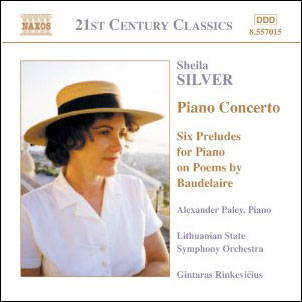The Six préludes pour piano, d’après poèmes de Baudelaire, were written in 1990 while Silver was in residence at the Camargo Foundation in Cassis, France, a small picturesque Mediterranean fishing-village nestled under the magnificent cliff, Cap Canaille. It was here that Silver and Paley met and their fruitful collaboration began. The Préludes were commissioned for the opening concert of the art exhibition: “Baudelaire: The Poet and his Painters,” (Heckscher Museum, Huntington, New York, October 1993).
About the Préludes Silver writes:
“The first prelude, La mer à Cassis, is inspired by Baudelaire’s poem La musique, in which the poet’s experience of listening to music is likened to a sail boat carried by the wind on the sea – sometimes gentle, sometimes stormy.
The second prelude, La pendule, comes from Rêve parisien, in which the poet describes his dream of a city built of marble, metal and crystal, brilliant and surreal. As the clock strikes noon, he gradually awakes from his dream, peers around his tawdry garret apartment, and reflects with disillusionment on his life. The prelude begins with festive music, during which the clock striking noon is heard as interruptive chords. The music between the chords is gradually transformed as the poet moves from his exhilarating dream to his dismal waking state.
The third prelude, La descente vers l’enfer, comes from the poem, L’irrémédiable. In it the poet describes a descent into hell, down a long spiraling staircase, with goblins and creatures jeering at every turn. At the end comes “Judgement.”
The fourth prelude, Dans la fôret, demi-brulée, takes its title from my frequent walks in a Mediterranean pine-forest which had just suffered a devastating fire turning everything black. Gradually, within weeks, a new growth of green carpeted the forest floor and wildflowers began to bloom. Baudelaire’s poem, Bohémiens en voyage describes a similar image: La tribu prophétique wandering in the desert. At first everything seems bleak as they trudge along, heads bent, but gradually they begin to notice streams of water flowing from the rocks, birds singing, and flowers blossoming, as if by magic.
The fifth prelude, Là, tout n’est qu’ordre et beauté, Luxe, calme, et volupté, is the refrain from L’invitation au voyage. It reflects the poet’s dream of escaping to an exotic place where all is bliss and perfection. The opening melody of the prelude is a setting of the actual words and evokes the simplicity and calmness of the poet’s fantasy dwelling.
The last prelude, Vers le paradis de mes rêves comes from Le vin des amants and invites the reader to lose his sorrows in wine and soar the heavens on winged horses, leaving all cares and troubles behind.

